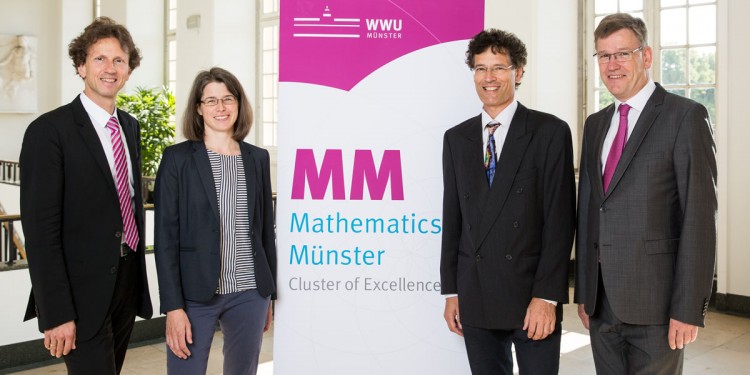
Connecting fields: The Cluster of Excellence "Mathematics Münster" celebrates its official launch
Last week the new Cluster of Excellence “Mathematics Münster: Dynamics – Geometry – Structure” staged its opening event at the University of Münster with a three-day colloquium. From 20 to 22 June, fifteen distinguished international scholars from nine countries held specialist lectures, providing insights into their current research.
The spectrum ranged from applied to theoretical mathematics. Prof. Dr Gigliola Staffilani from the Massachusetts Institute of Technology (MIT), for example, spoke on dispersive differential equations which describe the dispersion of light and water waves, as well as quantum mechanics. Prof. Dr Geordie Williamson from the University of Sydney presented an overview of new relationships between representation theory and geometry – two areas of theoretical mathematics whose overlap promises fascinating new insights. Prof. Dr Peter Scholze from the University of Bonn, who received the prestigious Fields Medal in 2018, the world’s highest distinction in mathematics, also presented his latest findings.
The broad range of topics reflected the basic principle of the Cluster of Excellence – the strong interconnection between mathematical subdisciplines. "These have increasingly become so specialised that mathematicians often don’t understand one another,” explains Prof. Dr Christopher Deninger who serves as co-spokesperson of the Cluster of Excellence with Prof. Dr Mario Ohlberger. But in order to solve the mathematical problems of today – and so doing, enable future breakthroughs in other disciplines – it is necessary to have all these subdisciplines working together in joint effort.
The opening colloquium was a first important step toward strengthening this interplay between mathematical disciplines. Of course, this did not only restrict to academic exchange, but also included an informal gathering. In the evening, the faculty and guests attended the concert “Das Schloss rockt” (The Castle Rocks), co-organised by Professor Deninger.
The Cluster of Excellence “Mathematics Münster” is one of the few purely mathematical clusters in Germany which was awarded funding this past January through the federal- and state-funded Excellence Strategy programme. “We see this as confirmation of our holistic approach and are very proud of our success in the scientific evaluation process,” said Professor Ohlberger. University Rector Prof. Dr Johannes Wessels also emphasised that “mathematics in Münster has long been a strong research field which has shaped the profile of the University. The Cluster of Excellence now allows us to raise the level of the research these scientists are doing even further – both nationally and internationally.”
The Faculty of Mathematics at the University of Münster has been home to some of the world’s top research projects and achievements for many years; it was chosen for two subsequent collaborative research centres (CRCs) and its members have been awarded four Leibniz Prizes, an “Alexander von Humboldt Professorship”, three “European Research Council (ERC) grants”, an “Alfried Krupp Award” for Young Professors and a “Max Planck Research Award”.
About the Cluster of Excellence "Mathematics Münster"
The Cluster of Excellence “Mathematics Münster: Dynamics – Geometry – Structure” creates an internationally visible research centre which bundles mathematics research in Münster devoted to addressing mathematical problems of fundamental importance today. The cluster views mathematics as an organic whole with multiple interconnections. It follows three basic principles: connecting mathematical fields, offering the best-possible support to talented junior researchers and improving equal opportunity and the compatibility of family and career. For more information, visit www.mathematics-muenster.de.
